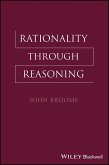What do you find more trustworthy, experts or numbers, personal know-how or objective facts ? Can science claim special authority based on the objectivity of its methods? Are our ethical decisions always better when we strive to be impartial and unbiased? Why should we value objectivity, and is it achievable anyway? These are a few of the thought-provoking questions Guy Axtell asks in this comprehensive new text book, employing examples from the natural and social sciences as well as philosophy. This unique introduction surveys the key issues in a clear and concise way, assessing the nature of objectivity and value of the demand to be impartial decision-makers. Moving beyond the fundamentals, Axtell explores contemporary feminist and social epistemological attempts to reconstruct the concept of objectivity, explains the implications of the so-called science wars for philosophy and the analytical method, and the ethical consequences of these debates. Objectivity is an excellent introduction to one of the most exciting areas of study in philosophy and science today. Students and scholars alike will value this balanced guide to a hotly contested, and vitally important, topic.
Dieser Download kann aus rechtlichen Gründen nur mit Rechnungsadresse in A, B, BG, CY, CZ, D, DK, EW, E, FIN, F, GR, HR, H, IRL, I, LT, L, LR, M, NL, PL, P, R, S, SLO, SK ausgeliefert werden.









